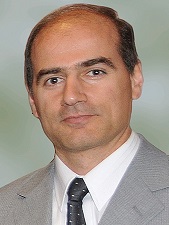AI, Sensors and Biometrics: a Systems Perspective
| IEEE Montréal Systems Council Chapter |  |
In collaboration with IEEE Montréal Sensors Council Chapter |  |
The newly formed Montreal IEEE Systems Council Chapter is inviting you to its inaugural event, featuring two IEEE Distinguished Lecturers, including the currnet President of the IEEE Systems Council, and the Editor-in-Chief of the IEEE Systems Journal.
Topcis will include discussions of the use of artificial Intelligence in biometric systems, and of data aggregation for usenosr networks.
Date and Time
Location
Hosts
Registration
-
 Add Event to Calendar
Add Event to Calendar
Loading virtual attendance info...
Speakers
 Vincenzo Piuri of Università degli Studi di Milano, Italy
Vincenzo Piuri of Università degli Studi di Milano, Italy
Artificial Intelligence for Biometric Technologies and Systems
Biometrics concerns the study of automated methods for identifying an individual by measuring one or more physical or behavioral features of him. Certain physical human features or behaviors are characteristics that are specific and can be uniquely associated to one person. Retinas, iris, DNA, fingerprint, palm print, or pattern of finger lengths are typical physical features that are specific to individuals. Also the voice print, gait, or handwriting can be used to this purpose.
Nowadays biometrics is rapidly evolving. This science is getting more and more accurate in identifying persons and behaviors. Consequently, these technologies become more and more attractive and effective in critical applications, such as to create safe personal IDs, to control the access to personal information or physical areas, to recognize terrorists or criminals, to study the movements of people, and to monitor the human behavior.
The use of biometrics in the real life often requires very complex signal and image processing and scene analysis, for example encompassing biometric feature extraction and identification, individual tracking, face tracking, eye tracking, liveness/anti-spoofing tests, and facial expression recognition.
Artificial intelligence techniques (including neural networks, fuzzy logic, evolutionary computing, and multi-agent systems) have been proved to be useful and effective in addressing this kind of data processing, especially when it is difficult to identify an algorithm while sufficiently descriptive examples are available, or when fuzzy descriptions are more natural to capture the essence of the problem, or when complex non-linear optimization is needed, or when multiple agents cooperate in solving the application problem.
This talk will review the domain of biometrics, its applications in various domains and the relevance of artificial intelligence, in particular neural networks and deep learning) to effectively solve various problems in these applications.
Biography:
Vincenzo Piuri has received his Ph.D. in computer engineering at Polytechnic of Milan, Italy (1989). He is Full Professor in computer engineering at the University of Milan, Italy (since 2000). He has been Associate Professor at Polytechnic of Milan, Italy and Visiting Professor at the University of Texas at Austin, USA, and visiting researcher at George Mason University, USA.
His main research interests are: artificial intelligence, computational intelligence, intelligent systems, machine learning, pattern analysis and recognition, signal and image processing, biometrics, intelligent measurement systems, industrial applications, digital processing architectures, fault tolerance, cloud computing infrastructures, and internet-of-things. Original results have been published in 400+ papers in international journals, proceedings of international conferences, books, and book chapters.
He is Fellow of the IEEE, Distinguished Scientist of ACM, and Senior Member of INNS. He is President of the IEEE Systems Council (2020-21) and IEEE Region 8 Director-elect (2021-22), and has been IEEE Vice President for Technical Activities (2015), IEEE Director, President of the IEEE Computational Intelligence Society, Vice President for Education of the IEEE Biometrics Council, Vice President for Publications of the IEEE Instrumentation and Measurement Society and the IEEE Systems Council, and Vice President for Membership of the IEEE Computational Intelligence Society.
He has been Editor-in-Chief of the IEEE Systems Journal (2013-19). He is Associate Editor of the IEEE Transactions on Cloud Computing and has been Associate Editor of the IEEE Transactions on Computers, the IEEE Transactions on Neural Networks, the IEEE Transactions on Instrumentation and Measurement, and IEEE Access.
He received the IEEE Instrumentation and Measurement Society Technical Award (2002) and the IEEE TAB Hall of Honor (2019). He is Honorary Professor at: Obuda University, Hungary; Guangdong University of Petrochemical Technology, China; Northeastern University, China; Muroran Institute of Technology, Japan; Amity University, India; and Galgotias University, India.
Email:
 Amir Aghdam of Concordia University
Amir Aghdam of Concordia University
Connectivity in Asymmetric Networks with Application to Data Aggregation in Underwater Sensor Networks
Connectivity of an asymmetric network represented by a weighted digraph is investigated in this work. A novel distributed algorithm based on the subspace consensus approach is introduced to compute the generalized algebraic connectivity as connectivity measure of asymmetric networks from the viewpoint of each node. After properly transforming the Laplacian matrix of the network, two sequences of one-dimensional and two-dimensional subspaces are generated iteratively by each node in a distributed manner such that one of them converges to the desired subspace spanned by the eigenvector(s) associated with the eigenvalue(s) representing the network’s generalized algebraic connectivity. The convergence analysis of the distributed algorithm is subsequently provided under some assumptions. The efficiency of the developed algorithm in computing the network connectivity is demonstrated by simulations.
Biography:
Amir Aghdam received the Ph.D. degree in electrical and computer engineering from the University of Toronto, Toronto, ON, Canada, in 2000. He is currently a Professor with the Department of Electrical and Computer Engineering, Concordia University, Montreal, Canada, and the Academic Code Administrator in the School of Graduate Studies. He was a Visiting Scholar with Harvard University in fall 2015, and was an Associate with the Harvard John A. Paulson School of Engineering and Applied Sciences from September 2015 to December 2016. His research interests include multi-agent networks, distributed control, optimization, and sampled-data systems. Prof. Aghdam is a member of Professional Engineers Ontario, Chair of the Conference Editorial Board of the IEEE Control Systems Society, Editor-in-Chief of the IEEE Systems Journal, and was an Associate Editor for the IEEE TRANSACTIONS ON CONTROL SYSTEMS TECHNOLOGY, IEEE ACCESS, IET Control Theory and Applications, and the Canadian Journal of Electrical and Computer Engineering. He was a member of the Technical Program Committee of a number of conferences, including the IEEE Conference on Systems, Man, and Cybernetics and the IEEE Multiconference on Systems and Control. He was a member of the Review Panel/Committee for the NSF, Italian Research and University Evaluation Agency, Innovation Fund Denmark Projects, and the Natural Sciences and Engineering Research Council of Canada ECE Evaluation Group. He was the 2014–2015 President of IEEE Canada and Director (Region 7), IEEE, Inc., and was also a member of the IEEE Awards Board for this period. He is a recipient of the 2009 IEEE MGA Achievement Award and 2020 IEEE Canada J. M. Ham Outstanding Engineering Educator Award. Dr. Aghdam was a member of the IEEE Medal of Honor Committee for 2017–2019 and is currently the Vice-Chair of the IEEE Medals Council.
Email:
  |

